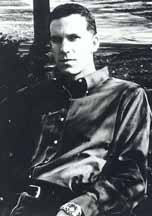By David R. Mark There was a review recently for the new NBC television show "Stark Raving Mad" that went something like this: The actors have great timing. The "Odd Couple" scenario creates funny situations. So why am I not enjoying this more? To compare a sitcom to Josh Russell's debut novel, Yellow Jack (W.W. Norton, $23.95), would do it an injustice. But after reading this 250-page work, I was left wondering why I didn't enjoy it more. The novel centers on Claude Marchand, who in 1838 flees Paris having stolen the secrets of the daguerreotype. Upon arriving in New Orleans, he opens a studio with his "soliotypes," which take the city by storm. But all that follows for Marchand — his business success, his friendships, his lust — come in large part because of yellow fever, or in slang, "yellow jack." In the 1830s and 1840s, yellow fever killed several thousand in the burgeoning metropolis. Marchand, with his "magic pictures" soon finds himself making dozens, if not hundreds, of memorial soliotypes. As the death toll increases, Marchand's fame and financial success follow. Simultaneous to his success, Marchand becomes captivated by Vivian Marmu, the daughter of a respected New Orleans sugar trader, whom he meets when she is 10. Their lust reaches new heights as she reaches puberty, but is later guided by the effects of the fever — the deaths of her parents and fiancee. As his success crests, Marchand becomes overwhelmed not by the death surrounding him but by the demands it creates on his life. That, combined with his exposure to quicksilver and other chemicals used in the soliotype process, lead him to madness. Russell, a teacher at the University of Florida, does not write beautifully. You will not quote any one-sentence principles or pithy quips from this book. But he does beautifully create a mood that hangs over the characters like the fever over New Orleans. As the novel progresses, you sense Marchand's sanity eroding, and you feel the despair among supporting characters. The novel has three voices: Marchand, speaking in the first person with a working-class feel; the "octoroon" Millicent, Marchand's one-time lover, who writes diary entries, symbolizing what society will not let her say publicly; and, a historian, reviewing Marchand's soliotypes with great respect. Traditionally, a first-person presentation creates suspense. The reader learns with the main character, and what obstacles lurk out of sight can surprise both character and reader together. But that suspense is somewhat lost, as Russell chooses to begin each segment of the novel with the historian's review of selected soliotypes and the history surrounding them, followed by Marchand's voice, covering in "you were there" detail the same history. The reader is left not wondering what will happen next, but how it will happen. At times, this works to Russell's advantage, for the sanitary review by the historian, and the blunt reality of Marchand's world often differ, an inside joke for the reader. At other times, the results are more bland or even redundant. Millicent's diary entries, meanwhile, are the least interesting part of the novel. Her voice is not distinct enough. Russell does not provide her with a distinct dialect, and her observations only occasionally provoke the reader. As her character's importance dwindles, her diary entries take on the role of curious bystander. I found myself skimming. What also is curious about Yellow Jack is the dispassionate way Marchand's character deals with the death that surrounds him. Early in the novel, Marchand overcomes his bout with the fever, and it would appear this symbolizes his immunity to its effects on New Orleans. He is annoyed by the work it brings, but only rarely does he seem moved or shocked by the effects of the fever. In truth, yellow fever — the specific ailment — is not a key to this novel's success or failure. Seemingly, Russell could have written about any plague affecting any American city in the 19th century. Using yellow fever in New Orleans in the 1830s and 1840s provides a historical frame for the novel, but Russell does not always provide the reader with a distinctly New Orleans flavor. The city's rich history and culture seems to be missing at times from Yellow Jack, replaced with more vague notions of the breadth of people and places that make the Crescent City one of the nation's unique treasures. Ah, but it is a debut novel. Russell creates a worthy plot and he offers a unique style — two elements missing from many first novels. But like so many books, movies, television shows and the like, it doesn't quite fulfill its promise. Jack Russell's Yellow Jack can be bought directly from Amazon.com
Copyright © The Southerner 2000.  |

